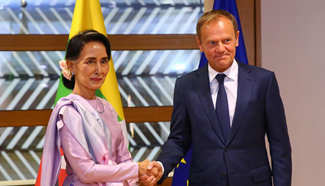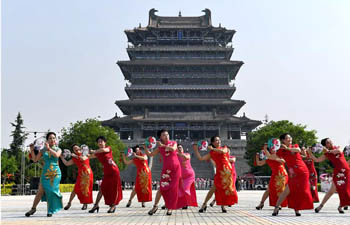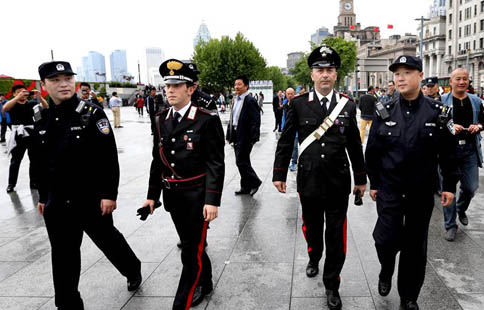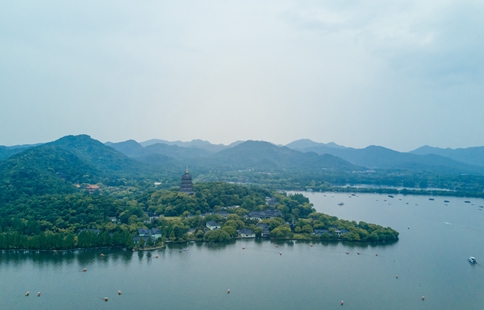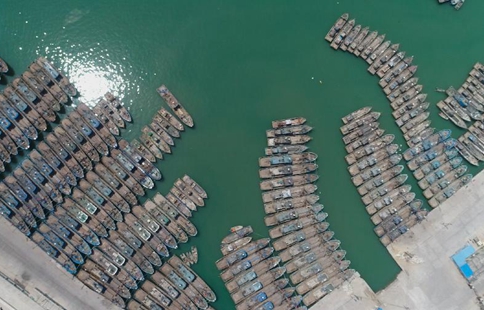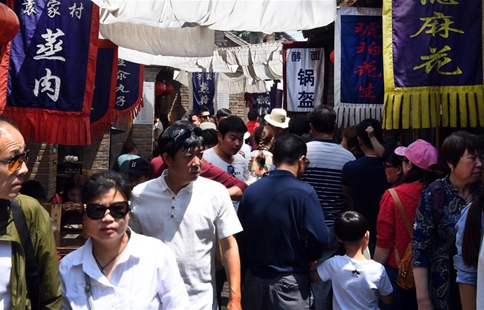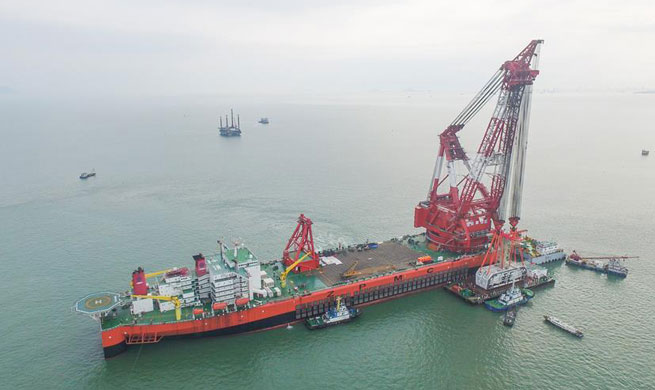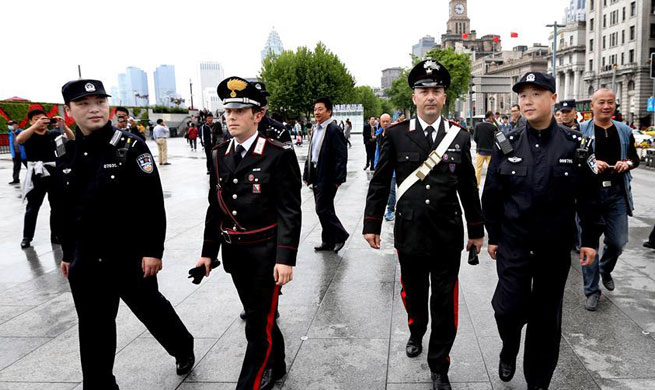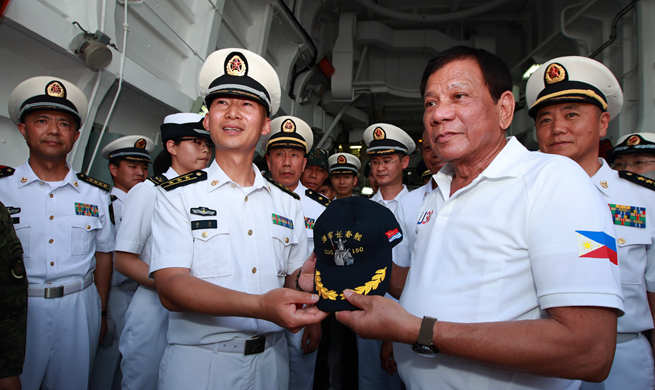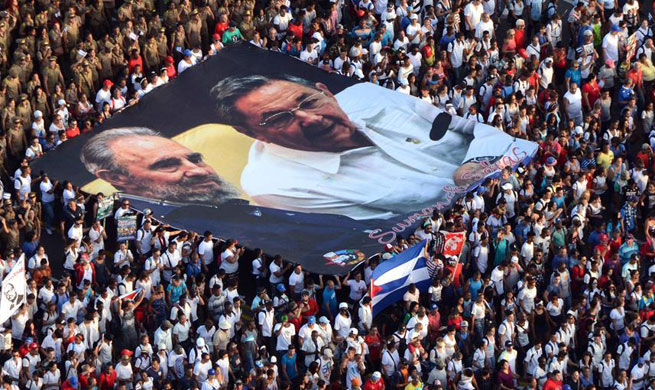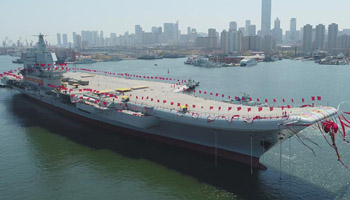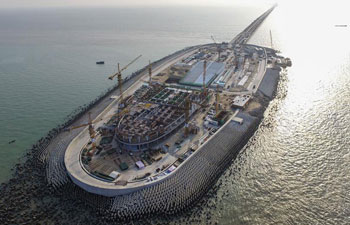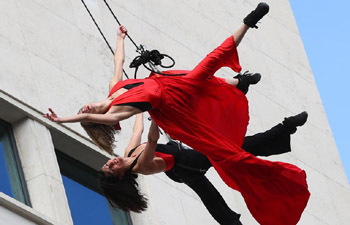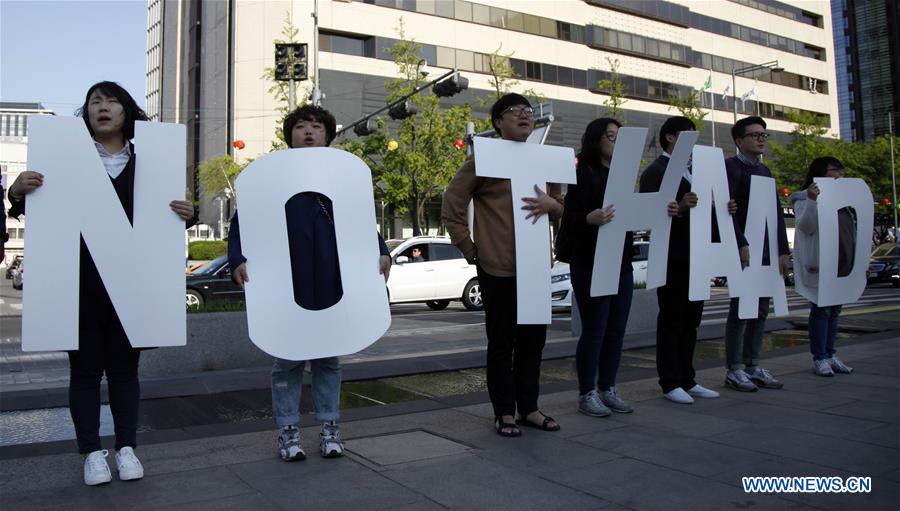
Protesters hold banners and shout slogans during a demonstration against the Terminal High Altitude Area Defense (THAAD) in Seoul, South Korea, on April 27, 2017. South Korean people and religious figures gathered in central Seoul, where millions of people had demanded the impeachment of former President Park Geun-hye, for the removal of the Terminal High Altitude Area Defense (THAAD) from their territory and bring peace to the Korean Peninsula. (Xinhua/Yao Qilin)
SEOUL, May 2 (Xinhua) -- The U.S. Forces Korea (USFK) said Tuesday that the Terminal High Altitude Area Defense (THAAD) anti-missile system, which was deployed last week in southeast South Korea, is "operational."
USFK spokesperson Rob Manning said that the USFK "confirms the THAAD system is operational."
The installed THAAD system has the ability to "intercept missiles" from the Democratic People's Republic of Korea (DPRK) and "defend South Korea," according to the spokesperson.
On Wednesday, about 20 U.S. trucks and trailers carried part of THAAD elements, including radar, to a golf course at Soseong-ri village in Seongju county, North Gyeongsang province. The golf course was designated as the THAAD site.
The installed THAAD elements include two mobile launchers, an AN/TPY-2 radar and other equipments. A THAAD battery is composed of six mobile launchers, 48 interceptors, the radar and the fire and control unit.
The deployment of THAAD in South Korea has been strongly opposed by regional countries, including China and Russia, as it breaks strategic balance in the region.
Following the unexpected deployment, protests have been staged by the general public, residents and peace activists.
Residents and peace activists, who had been on the guard right beside the entrance road, tussled with thousands of South Korean policemen on Sunday to block two U.S. oil tankers attempting to enter the golf course.
During the tussle, two residents from Seongju and Gimcheon were detained and two others injured. Gimcheon is a city bordering Seongju county, which is directly facing the super microwave-emitting radar.
On Monday, they blocked about 30 South Korean police buses attempting to pass the entrance road as they saw the higher-than-usual number of the buses as a sign of preparing for another attempt to allow additional THAAD elements to be transported to the golf course.
The residents and peace activists have continued to hold protest rallies at the Soseong-ri village every day, taking turns in standing sentry.
Three Won Buddhist monks started a hunger strike at the Gwanghwamun square in central Seoul, a day after the deployment of part of the THAAD elements.
The Won Buddhist holy ground is located near the THAAD site. Many religious figures, including priests, pastors and Buddhist monks, joined the protest rally against the THAAD system.
Meanwhile, the THAAD issue has become a major talking point ahead of a presidential by-election scheduled for May 9.
The anti-THAAD association, comprising residents and activists, released the results of a survey of the five major presidential candidates to inquire about their respective positions on THAAD.
Moon Jae-in of the biggest Minjoo Party, a frontrunner in recent months, repeated his earlier stance that the final decision should be made by the next government, according to the results unveiled Tuesday.
He said the decision would be made under basic principles of prioritizing national interests and public consensus, emphasizing the importance of sufficient consultations with the United States as well as China and Russia.
Moon noted that the final decision will require public discussions and parliamentary ratifications, adding that if he is to be elected as president, he will review all of the decision-making processes relevant to THAAD.
Sim Sang-jung of the minor progressive Justice Party made clearest her stance, saying the forceful deployment of THAAD must be immediately stopped and that the deployment decision must be renegotiated with the United States.
She claimed the need for renegotiations given the past cases of the renegotiated U.S.-South Korea free trade deal and the renegotiation on the return of the U.S. wartime operational control of South Korean troops to Seoul.
Sim had an identical position with Moon in that she said parliamentary and public approvals will be required for the THAAD deployment.
Ahn Cheol-soo of the centrist People's Party, a runner-up to Moon, showed an ambiguous stance, saying he will ask the Trump administration to remove THAAD only if the DPRK's denuclearization is advanced.
Regarding the parliamentary ratification, he said the ratification will be required only if South Korea bears the cost of 1 billion U.S. dollars to install the THAAD battery.
U.S. President Donald Trump said in a recent interview with the media that South Korea should pay the cost of the U.S. anti-missile system installation, which he estimated at 1 billion dollars.
The anti-THAAD association criticized Ahn for his obscure stance, saying such a position was "very inappropriate."
The association expressed deep regrets towards Hong Joon-pyo of the former ruling Liberty Korea Party and Yoo Seong-min of the minor conservative Righteous Party, who did not accept the survey request.
It said the conservative candidates dismissed a responsibility as presidential candidates, adding any next president must reverse the THAAD deployment decision by putting the highest policy priority on the issue.




